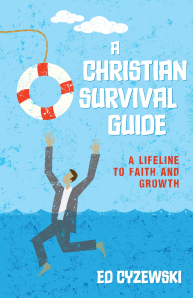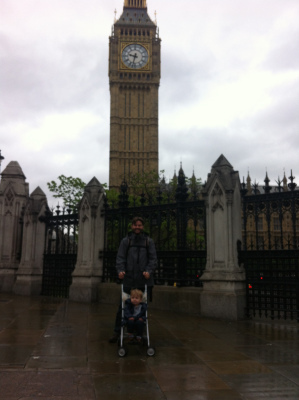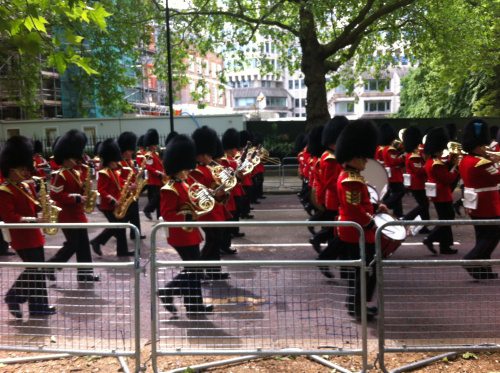Ed Cyzewski's Blog, page 34
June 5, 2014
A Deeper Church: What Is the Cure for Fundamentalism?
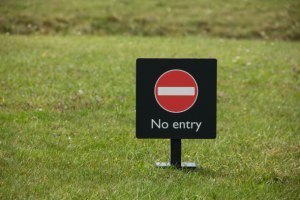 I’m writing for the Church channel today at Deeper Story:
I’m writing for the Church channel today at Deeper Story:
“So you’re telling me that I’m going to hell and everyone at this school is going to hell if we don’t believe the same thing as you?”
I nodded.
My friend Jon finally got the message. I’d succeeded in sharing the “bad news” about everyone in the world. We’re all sinners on the brink of eternally burning in the flames of hell. Now he just needed to ask how to be saved.
“You’re crazy. What’s wrong with you?” he shouted at me. “Who told you all of this stuff?” His face grew red and he began to wave his arms around in frustration. A passing teacher tried to calm him down.
“I’m not going to calm down. My friend thinks we’re all going to hell. He’s in some kind of religious cult.”
My attempt at evangelizing my best friend in high school ended with him ranting and raving. It was hardly the earnest request for the good news about eternal life in heaven with Jesus Christ. Everything in the evangelism book and video fell to pieces in a matter of minutes.
Besides failing to “save the soul” of my best friend, I also lost his friendship forever. That was it. We still hung out in the same crowd, but no one really talked to me. I had nothing to talk about any way. They had television shows, movies, and music to discuss. I had sermons, Bible verses, and Adventures in Odyssey.
Virtually the same conversation played out with my family. Almost every relationship I had broke down because my fundamentalist church instructed me to share the Gospel with everyone I knew–that is, if I really cared about them.
Read the rest at A Deeper Story


June 4, 2014
I Thought That Receiving Communion Was All About Me
There are moments during communion when I’m overcome with the enormity of the Christian faith. Followers of Jesus span back through centuries and circle around the world. We have been practicing this sacrament for the history of our faith, and it will continue for years to come.
Sitting in the time between worship and communion yesterday, I thought of the many other churches around our country gathered for worship at that time. In particular, I thought of the few pastors who have abused their authority, people in their congregations, and sometimes even people beyond their congregations.
There are pastors and teachers who have helped cover up child abuse scandals in some congregations.
There are pastors and leaders who have threatened fellow Christians with lawsuits.
There are pastors and leaders who throw around heavy words of condemnation at those who disagree with them.
It was all too much to bear. I wanted to take scissors to Jesus’ prayer in John 17. United with them? The only thing I’d like to unite with them is my fist—this from a guy who hasn’t thrown a punch since the age of 13.
How did these divisions happen? Where did we go so far off track? While a divided church is as old as Paul’s letter to the Corinthians, the divisions among us felt particularly acute even as I prepared to take communion.
Searching for answers, I revisited the scars left by more conservative critics who have called the integrity of my faith into question because my God wasn’t as dominant and powerful as their own or because I saw culture, gray areas, and complexity in the pages of scripture where they only saw black and white.
It is a deep hurt to have sought out answers with integrity, to arrive at different answers than your original tribe, and to then be cast out as a threat, false teacher, and enemy.
That isn’t to say I was innocent and pure all along as my faith ventured into new territory. I was quite angry for a season. I felt like I’d been tricked—as if someone had set up a curtain to hide the true nature of things.
I don’t think you can stop the anger and resentment from taking hold when your long-held beliefs crumble. At least I don’t know how I could have stopped it, and as I see other Christians pulling back the curtain of their conservative faith, I don’t have anything better to offer them.
Our personal histories lead us in different directions. Sometimes there is grace for these differences. Sometimes there are divisions over the abuse of power that cannot be overlooked.
Both my past hurts and the folly of abusive leaders today left me despairing as I prepared to partake in one bread and one cup on Sunday morning.
Perhaps I despair so easily because I fail to grasp the lesson of communion each Sunday. I’ve been too focused on myself.
I approach communion completely absorbed in my own spiritual health, fearful that I will take the body of Christ in an unworthy manner. I want to have a clean slate between myself and God. Communion has been about healing my own soul.
Even our divided churches could teach us about the dangers of seeking our own salvation at the expense of everyone around us. There is a tendency to pursue salvation by remaining pure, cutting ourselves off from others.
Isn’t this act of taking the body of Christ an act of unity, a mystical binding together of Christ’s body in this one simple act?
Do I believe that Christ can not only heal me but also heal his church, even the parts I find reprehensible?
What if my part right now is to keep receiving communion, to keep praying for a healed church that can minister to a hurting world? Some Sundays, like last Sunday, that feels like an enormous leap of faith.
Communion reminds me that God endures even as denominations and leaders rise and fall. The Kingdom continues to advance, and Christ’s body still offers us healing, even if we aren’t looking for it.


June 2, 2014
If You Want to Stop Sinning, Stop Trying to Stop Sinning
I used to plant the lettuce in my garden in long rows, thinning the sprouts according to the seed package’s specifications. Then I spent the rest of the summer pulling all of the weeds around my lettuce.
It’s likely that I pulled more weeds than harvested lettuce.
I liken weeding to mowing the lawn one blade of grass at a time. It’s my least favorite part of gardening, and since we garden organically, I had to come up with a better weed prevention strategy.
I thought I found my solution with a bale of straw. I could fill all of the gaps in our garden with straw and keep the weeds to a minimum. We saw a drop in weeds, but I still had to keep up with them. At the very least, I cut our weeding in half.
However, once we moved to Ohio where I built two raised beds in our small backyard, I discovered that straw wasn’t going to work. An army of slugs took refuge in our straw and used it as a highway to eat everything in our garden. We needed to find a way to prevent weeds without using chemicals and without covering the ground with fabric that would deplete the soil or straw that gave safe haven to slugs.
I found the solution in my in-law’s garden.
My in-laws have been gardening for as long as my wife can remember, and their lettuce patch replaces my orderly rows with a sprawling patch thick with lettuce. They spread their seeds in an area, thin the sprouts a bit, and let the heads of lettuce grow up right next to each other.
This was a huge “Aha!” moment for me.
We now grow a lot more lettuce and spend virtually no time weeding. As of this summer, I have yet to pull a single weed by our lettuce because our seeds were so evenly scattered.
Mind you, this is a bit of work at first. I had to spend a lot of time thinning the seeds I’d scattered. However, in the long run, I don’t have to do a thing most days. There are no weeds competing for garden space because I’ve invested time in creating so much life in our garden.
The key to defeating weeds is to invest in growing healthy plants that will take their space.
I was doomed to keep fighting weeds as long as I was focused on weed prevention rather than plant cultivation.
I have seen the same principle play out in my life when it comes to Christian living. If I want to leave sin behind, I have to stop fighting against sin. We can only leave sin behind when we pursue something (or someone) else in its stead.
When we talk about repentance, we often speak of an abrupt “about-face” or turning away from our plans to God’s plans. If you think about it, fighting sin or sin-prevention strategies prevent us from actually turning away from our sinful ways in order to pursue God.
We’re so busy looking at what we can’t have that we’re unable to see what God offers instead.
Fighting sin does nothing to cultivate the health of God in our lives. We’ll just keep moving from one “weed” to another, waiting for another weed to sprout in our lives since nothing else has been sown in its place.
While we can always take commonsense steps to avoid sin, the real victory over sin is won when we give God space in our lives and actively pursue God. Whether serving others or devoting time for prayer, these steps toward God keep us turned away from sin. Repentance is turning away from sin, but holiness happens in our daily interactions with God.
There is freedom in the pursuit of God that conquers sin. While there are moral standards of a sort for Christians, we leave certain paths behind because of Christ’s “yes” rather than our own “no” that strives for holiness.
We have been called. Christ has said, “Come!” to you and to me because we surely thirst for the redemption he offers.
He has better things for us, but we’ll never leave our own plans behind if we refuse to believe it.


May 30, 2014
Praise for A Christian Survival Guide in Publisher’s Weekly
I hit a publishing milestone this week. We celebrated it with drinks on the front porch last evening. Before I share the details, let me give a little bit of background…
I started working on my latest book A Christian Survival Guide: A Lifeline to Faith and Growth several years ago, but I had a hard time pitching it. So I just left a summary of it in the “Other Ideas” section of my other book proposals.
After literally weeping my way through a pitch for a book about finding Christian community in 2012, the editor contacted me a few weeks later. “The church book could work in the future, but we’re really interested in that Survival Guide book in your proposal.”
No pitch needed.
I started dreaming of the Survival Guide book in 2008 and 2009 as I spoke to one young adult after another about all of the issues and questions that made it hard to be a Christian. Some were really struggling to follow Jesus, while others were on their way out of the faith. They were people at book events, childhood friends, colleagues, and family members.
So many people felt stuck, often stymied by doubts or unsatisfying answers from their churches. I could relate. I had many of the same questions and struggles.
Prayer wasn’t working.
Hell, evil, and the genocide passages in the Bible were disturbing.
The Bible was often used as a weapon against them.
The Bible could have errors… and then what?
The list went on.
What if I wrote a book that explored the range of Christian responses to each issue?
I didn’t want to give pat answers. I just wanted to dive into these topics in short, conversational chapters that provided just enough information to help readers get their bearings and then encourage them to dig deeper.
There are heavy chapters about the problem of evil and lighter moments where I offer up parodies of biblical interpretation such as the Papyrus Driven Church—Paul’s definitive guide to church planting via letters. It’s the closest I could come to capturing a real life conversation on the typed page—at least, a real life conversation with me.
This makes the Survival Guide a strange book to pitch. “It’s about everything that threatens our faith AND it uses humor.”
Still, my wife who is no fan of Christian nonfiction encouraged me to keep at it. She always enjoyed the chapters, and if I can win her over, I like to think that I can win anyone over. My pastor said that the chapter on hell was one of the best treatments he’s read on the topic.
Even a few of my writer friends gave endorsements:
“With grace and humor, Ed Cyzewski provides tools and suggestions for surviving the dips and crises that are an inevitability of the Christian life. If you’re feeling stuck in your faith and aren’t sure how to proceed, Ed’s gentle challenges might be just what you need.”
- Addie Zierman, author of When We Were on Fire
Coming to the faith is just the beginning. We also have to survive it. The Christian Survival Guide book doesn’t try to dismiss life’s hardships or faith’s doubts, but it instead walks through them honestly, clinging to both God and authenticity the whole way.
What do you do with the Bible’s most disturbing stories? What about those nights that doubt eats away at your insides? Ed Cyzewski’s new Christian Survival Guide book bravely and honestly delves into questions that each of us face at some point in our faith journey, but may not have the courage to ask.
- Sarah Raymond Cunningham, author of The Well-Balanced World Changer
I also gave out some early copies at the Festival of Faith and Writing this past April, and Mary Beth Pavlik wrote an email a few days later about the Survival Guide:
“I am starting to think that perhaps you wrote it for me. I’m still in the early chapters but wanted to say thanks… I’ve been needing it.”
However, you can always dismiss the praise of your wife or your friends. They could be biased. It could still be a pretty terrible book, right? I was still waiting for the first critical review.
Then yesterday I learned that Publisher’s Weekly had reviewed A Christian Survival Guide. The review gave a nice summary of the book, praised it for covering so much ground in such a small space, and then praised the book quite a bit:
“Cyzewski approaches each topic with candor, sharing stories that make it easy to relate to the topic at hand. While many of the topics are complex, he provides a point of entry into each and raises thoughtful questions about how much importance Christians can assign to aspects of the discussion…. What emerges… is an accessible and thoughtful work that is well suited to those new to Christian faith and practice.”
The ellipsis you see is the reviewer’s one critique of my book. Why hide it?
The reviewer wrote that the one thing this book really needed was a list of “suggested books for further reading” at the end of each chapter. Here’s the thing, I provided exactly that, but the entire list is at the end of the book, sorted by chapter. The reading list was the last thing we added, so perhaps it was there in time for the review.
Reading list aside, it has been immensely gratifying to know that early readers and reviewers found the book so helpful. While the PW review focused on new Christians as the book’s primary audience, it was originally written for Christians who have unresolved questions or ongoing struggles with their faith. It just turns out that new Christians will relate to many of these questions and struggles, giving the book two very different audiences who are searching for many of the same answers.
You can learn more about the book, including a preview of the first chapter and table of contents at the Kregel Publishing website. You can also pre-order the book there or visit Amazon to pre-order. We expect it to release in late July.
How to Get a Review Copy
Do you review books on your blog?
You can receive a print copy this summer by signing up for blog tours at Kregel.com. (sign up by June 1st)
The blog tour is scheduled for August 18th.


May 29, 2014
Franklin Graham Does Not Understand Holiness

Image of Franklin Graham from The Christian Post.
In a recent speech, Franklin Graham demanded that pastors in his audience speak out boldly on several moral issues, lest they fall under God’s wrath for being cowards. He said:
“The definition of a coward: a coward will not confront an issue that needs to be confronted due to fear. That is a coward,” said Graham.
“God hates cowards. And the cowards that the Lord is referring to are the men and women who know the truth but refuse to speak it.”
Graham essentially used the fear of God to prompt his audience to overcome their fears of speaking out.
There are many different aspects of Graham’s talk we could challenge, but I’d like to call into question the role of a wrathful God who hates people in prompting people to change their behavior, such as speaking out on specific moral issues. Graham’s right wing agenda aside, is God really in heaven with his finger on the “hell” button, waiting for us to screw up? I know that I’ve lived this way, fearing that one day’s failure had finally cut me off from God.
Most importantly, how does this approach to God’s wrath and holiness compare to the message of Jesus and the New Testament writers about holiness?
A misconception of holiness is at the heart of Graham’s statement. According to Graham, God demands a particular lifestyle, one of moral crusading in American culture, and those unwilling to conform to God’s program receive God’s hatred and an eternity of suffering.
I’ve stated that crassly, but I believe it’s accurate because I also thought that way for most of my life. It’s pretty much what you’ll hear today if you listen to most Christian radio shows.
The only way to avoid God’s wrath in Graham’s system is to change your actions out of fear for self-preservation.
Did Jesus relate to people through fear and the threat of his hatred?
How Did Jesus Interact with Sinners?
Jesus said he didn’t come to judge the world. Isn’t that nice to know? Perhaps he knew that his followers would do enough of that in the future.
In fact, Jesus adopted the role of doctor, comparing the “notorious sinners” of his day with the sick. They were still told to leave their lives of sin, but he didn’t walk around telling people to clean up their acts or God would hate them.
In fact, Jesus sat down to share meals with tax collectors and women with unsavory reputations. When Jesus saw someone living in sin, whether that was cowardice, sexual immorality, cheating, or violence, he had… wait for it… compassion.
Rather than Jesus pounding his fist on the table and shouting that his followers needed to shape up, he slapped his palm to his head when they failed to understand the gift of the Spirit that would empower them to serve others rather than rule as kings.
Far from sitting with his finger on the hell button, Jesus rolled up his sleeves and entered into real life with people. He humbled himself, even taking the form of a servant to help us find the way of redemption.
He called his disciples “friends” rather than threatening them with an eternity of suffering.
Before facing the cross, he promised that the Spirit would come to empower us, fill us wisdom, and guide us into all truth. Yes, there are consequences for rejecting the message of Christ. But he related to others through mercy and grace, imparting his Spirit to imperfect people who desperately needed God’s presence in order to pursue holiness.
How Do We Live Holy Lives?
Whatever you’re trying to do for the sake of Christ, the most important lesson from the Gospels and epistles is the centrality of the Holy Spirit. You won’t last long by simply trying harder.
Living in fear of an angry God will grow old.
When fear of God gives way to loving God as a father, holiness becomes a natural response.
Graham wants the pastors in his audience to fear God, and he’s hoping that this fear of God will trickle down into their congregations. He wants them to try harder as culture warriors in order to win God’s favor.
Sadly, Graham has adopted a kind of works-based righteousness for the sake of a political agenda.
Graham doesn’t realize that God’s favor already belongs to us. All who are thirsty are called to come and drink. God so loved the world after all…
Before the cross, God had an intense, undying love for us.
In the epistle to the Romans, Paul had God’s mercy rather than his wrath in mind. He also called his readers to be renewed in their minds rather than trying harder:
“Therefore, I urge you, brothers and sisters, in view of God’s mercy, to offer your bodies as a living sacrifice, holy and pleasing to God—this is your true and proper worship. Do not conform to the pattern of this world, but be transformed by the renewing of your mind. Then you will be able to test and approve what God’s will is—his good, pleasing and perfect will.” (Romans 12:1-2, NIV via BibleGateway)
I rarely call out specific Christians in my writing, but Franklin Graham’s approach to holiness is contrary to the message of Jesus. It grieves me to think that pastors who look up to him are receiving a message that fails to consider the mercy of God, the healing Jesus brings, and the power we receive from the Spirit to live in holiness.
Paul wrote that the Spirit of God does not give us a spirit of fear (2 Timothy 1:7, BibleGateway). We have been adopted as God’s sons and daughters. God demands holiness. It’s not a free for all, but God’s ways under the Spirit are not rooted in fear and wrath.
God relates to us as a caring and compassionate parent who desires to restore us—end of story.


May 28, 2014
The Inconvenient Interruptions of Toddler Spirituality
Ethan and I had just barely made the double decker London bus. Standing in a crowd of commuters, I wasn’t able to climb to the second level where Ethan loved to watch passing buses. I balanced myself with him and his folded up stroller, biding my time until we reached the Underground stop where seats would open up.
We had big plans to visit St. James Park with its fearless ducks, delightful sand area, and sprawling lawns. I had a ball, snacks, and several diapers in my backpack. Out of all our days in London, I had prepared the best for this one.
While waiting through the first few stops, I started to smell something that was a little bit… off. In a crowded bus with all sorts of people, you expect to smell all kinds of things. Besides, Ethan’s “epic” diapers had been primarily confined to the evening. I just needed to get to the second floor so he could have a better view of the passing buses and trucks.
A few stops later we ventured upstairs and a kind man moved so we could sit together by a window. The smell got stronger. I feared the worst.
A quick peak confirmed it, and I needed to take immediate action with a diaper wipe. Unfortunately, I forgot to pack the diaper wipes. I didn’t even have any napkins or tissues on hand.
I needed to get off this bus immediately.
But if I got off in the wrong neighborhood, I wouldn’t be able to find a store to buy wipes. I couldn’t put him in his stroller because that would be an even bigger mess. I couldn’t hold him the usual way because that would just make the leak worse. I couldn’t count on Ethan walking for more than a block. I had to play this just right to avoid an even more epic disaster.
Using Google Maps on my phone, I found a store near a stop that was five minutes away. We made it off the bus at that stop while I held Ethan up by the legs—a bit like a toddler torch. It looked ridiculous. The folded up stroller didn’t help.
However, when I consulted my map, I realized that I’d gotten off one stop too late. I ran four blocks instead of one with my toddler torch. Ethan can hardly walk a block in a straight line. He has to stop and point at water and gas caps in the sidewalk. He has to point at buses, trees, and traffic lights. He may sit down and resist walking. He may wander toward the road and cry if I try to stop him.
I had to keep moving. I had a diaper to change.
Sweating and dreading the state of Ethan’s diaper and clothing, I bought wipes and slipped into a nearby Pret a Manger to make the diaper change. Thankfully his outfit was untouched.
My sudden influx of urgency paid off.
Later that day Ethan and I took a walk around a park. There weren’t many people around. He pushed his stroller by my side, often turning around, going in circles, or venturing onto the grass.
I kept prodding him to walk forward, to keep moving, to “come on.”
As I entered my tenth minute of prodding, I finally asked myself, “Why am I doing this?”
It made sense earlier in the day that I needed to rush with a messy diaper on the line. A ruined outfit meant we would have to go home and lose our day at the park.
Without a diaper to worry about, I was simply coaxing Ethan along for the sake of efficiency. We had to get somewhere, I wasn’t sure where, but we had to do it fast. We were in a rush to walk from one end of the park to the other I suppose. I was rushing just for the sake of rushing.
Rushing is a lifestyle.
I had turned an occasional fast pace into a way of living where I frantically run from one thing to another.
On the following day we visited another park. Ethan wanted to walk across the grass with the stroller. It’s the most excruciatingly slow way to travel anywhere. I walked ahead and settled on a bench.
He eventually made it across the grass and started to cross a courtyard. However, something about the straps on his stroller caught his attention. He had to stop and snap them together.
It took a long time to get them snapped just right.
By the time he finished snapping them together, he wanted them unsnapped and began calling out to me for help. I told him to bring the stroller to me. Rather than pushing the stroller by its handles, he pushed it from the seat straps. It took an eternity to cross the courtyard, but Ethan wasn’t in a hurry.
Wandering London with a toddler was inconvenient and exhausting at times. I’d never sweated so much in all my life as I did during our three weeks in London. Every single thing required so much energy.
However, there were moments when Ethan forced me to slow, to adapt my pace to his own. He have been pointing at the 115th bus or the 32nd duck of the day, but that was fine. I didn’t need to rush him along while walking through the park.
The interruptions of a toddler can create their own sacred space. They put the brakes on our constant rushing from one thing to another.
They say that you can make God laugh if you tell him your plans.
God may laugh at our plans, but I say that God laughs even harder when we tell our toddlers our plans.


May 26, 2014
I Spent Three Weeks in London Looking for American Coffee and Feeling Guilty about Colonialism
I had big plans to write blog posts throughout our three-week research trip to London, but my limited work days really cut into my blogging time. Rather than sharing several reflections from my time in London, I’m going to rattle off a few observations and share a some of the big feelings I had over there…
Roaming the streets of London with Ethan over the past three weeks has felt good and familiar. There have been many other aspects of this trip that have been incredibly hard, especially my wife’s long workdays in the archives and Ethan’s difficulty settling down at our flat. However, the walking about part brought it’s own pleasant surprises.
Having grown up on the edges of Philadelphia, there’s a familiarity to the city of London: as if Philadelphia is a small, rougher version of it. At one point in the history of the British Empire, Philadelphia was only second to London in size, so that makes sense. The architecture in particular reminds me of home, even if the accents I hear and the absence of decent drip coffee drive home just how far away I am.
Wandering London for three weeks has also been a study in prosperity and affluence. I’m surrounded by go-getters and game changers: people who are on their way up or at least fighting for a place at the big tables of global finance, government, and business.
The current is strong. At times I felt pulled out to sea with them into their ocean full of big fish. As a work from home dad who makes as much in a month as some of them make in a day or a week, it was easy to feel insecure and aimless in life.
What do I have to show for my labor?
What kind of position and influence do I have?
It’s been a rubber meets the road moment for my theology. Do I truly believe that the writing I’m doing is worth anything in the grand scheme of things? By developing the gift of writing that I believe God has given me, am I seeking first his Kingdom or longing for the same stuff everybody else has?
It’s been a heavy three weeks at times. But then I have my beautiful little boy who often reminds me that I’m using the wrong markers for my success.
My time in London wasn’t always full of existential angst and anxiety over my work…
For instance, it was pretty hard to find my way around at first because of the location of street signs. The street signs languish on the sides of buildings so that you have to wander a bit until you find them. Seriously Brits, how hard is it to stick a pole in the ground near the corner?
It goes without saying that my instincts were complete rubbish at crosswalks or “zebra crossings” as they call them here. I knew which way to look for cars—the opposite of what I expected. But once my feet hit the street, my instincts kicked in and I was inevitably the only person crossing to the other side looking to his right.
The bus system has been glorious. I mean, really. You can’t get better than this bus system. We can get anywhere across town and treat the ride as a site seeing tour—which in Ethan’s case is merely spotting more buses and traffic lights or “Eeeee-yo’s” as he calls them. When I bought him a toy bus, he said the word “bus” continuously for fifteen minutes while pointing at it.
The coffee situation was quite rough. Most English cafes serve up a more Italian style of coffee, meaning that you’ll be hard pressed (pun intended) to find drip, filter, or, as I like to say, “REAL” coffee. The best source for real coffee was Pret a Manger, where I could buy a cup of “filter” coffee for a pound. Every other source of coffee was disappointing.
Americano’s were too watered down and weak. I would have asked for a second shot, but we were already in the two pound neighborhood for a drink that I didn’t particularly enjoy, so I ended up planning my day and then locating a Pret a Manger where I could pick up real coffee after getting off the bus.
At one point I stopped by Starbucks for an overpriced cup of their horrible Pike’s Place roast, and I asked for “filtered” coffee. The guy looked at me confused. I was hungry, tired, and, as one may imagine, in need of caffeine. I wasn’t in the mood to say the password for “coffee.” I snapped a little: “I don’t know! Drip, filtered, whatever you people call American coffee.”
Ethan didn’t have to worry about coffee, and he found the streets of London endlessly fascinating. Between the buses, trucks, and traffic lights, he found something to amuse himself wherever we went.
We spent a good bit of our time at St. James Park, which had a sand pit, fearless ducks, and close proximity to the soldiers. He loved pushing his stroller along the paths, and I enjoyed the amazing gardens and crowds of tourists who gathered around squirrels to take pictures.
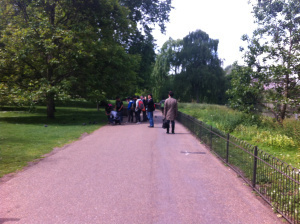
They traveled around the world to visit London… and took pictures of a squirrel.
I’m not sure which countries don’t have squirrels. As an avid gardener, I have a white, hot hatred of those long tailed rats. They’re always digging up our plants and flowers just for the pure joy of destruction.
You know who else enjoys destroying stuff? Satan. Think about it.
On a recommendation from Preston Yancey, we also spent several days at Coram’s Field, which had a variety of age-appropriate playgrounds, sand pits, and animals. The chickens, rabbits, and goats were a huge hit. Ethan would still be there if I hadn’t dragged him away.
When wandering around Bloomsbury, we also stopped at a lovely little playground in Bloomsbury. I got to people watch as tourists strolled by on their way to the British Museum, while Ethan went up and down a slide for a solid hour.
As much as I loved wandering the streets of London, especially the Bloomsbury neighborhood, I got the same eerie feeling that I get in Philadelphia or any other city in the northeast U.S. with ties to shipping and trade during the colonial period, let alone southern cities with ornate exteriors. Much like the colonial cities in America, a great deal of the wealth that has poured into London over recent centuries arrived because of the systemic exploitation of colonies and slaves.
That isn’t to ignore that some people have worked and are working to right these wrongs. It’s just an uneasy feeling I get around anything majestic and beautiful around here. There were plenty of monuments to people who were moral monsters—some being moral monsters who also called themselves Christians. There were a few cringing moments
Perhaps the funding for certain buildings was all gained through ethical industry and hard work. However, if history is any teacher in this, it’s most likely that many of the fine homes I passed each day had one kind of connection or another to the exploitation of colonies.
And while we’re talking about things that make me uneasy, let’s talk about all of the soldiers in downtown London. Ethan couldn’t get enough of the marching bands serenading us during the changing of the guards. He heard the pounding drums and started pointing in their direction saying, “Solders! Solders!”
We would walk alongside them as they marched ahead of about four companies of guards.
This was a wonderful event and spectacle for kids. The soldiers marched in a tight formation keeping crisp time. The bands played peppy songs that have been stuck in my head ever since.
However, there’s something very uneasy about the pageantry of war. Sure the bands help everyone march in time, but then a drill sergeant plays the same role. The dress uniforms, the coordinated marches, and the festive bands all add an appeal to something that is otherwise horrible: war.
I couldn’t shake the feeling that these soldiers, who were on leave from deployment, have been exposed to some of the worst conditions we could imagine. What we see of war is the marching, parades, and festivities. It’s brilliant propaganda.
As a follower of Jesus I can’t say I’m a 100% pacifist, even if his command to love our enemies hounds me. That being said, the pageantry of the guards left me as unsettled as it left Ethan delighted.
Perhaps the fancy uniforms and bands don’t have the same appeal as in times past. However, the reminder of their past roles haunted my mind.
My misgivings aside, it was hard to leave London. Our neighborhood felt very familiar to our own. It was filled with people our age and delightful, family-friendly pubs where friends gathered to talk and the beer held secondary importance.
I made a point of sampling as many local dishes as I could, such as meat pies, fish and chips, bangers and mash, a full English breakfast, and buttered bread pudding. It wasn’t the diet that leads to a long life, but meat, fried food, and bread worked for me.
Almost to a person, the English were friendly people, but they were more like New England friendly than the bouncing, in your face friendly you may find in the American south or west coast. When the airlines lost our bags on the way over, the man behind the counter quickly took our information and said, “Not to worry. We’ll sort it out. Should have it to you tomorrow at the latest.”
His calm and simple assurance helped me calm down as I feared the worst for our bags. True to his word, our bags arrived by noon on the following day.
I also need to make a confession of sorts. It’s not that I had preconceptions about English men, but when we arrived at the airport, I kept noticing that many of the English men I saw were tall and “solid.”
I took an inventory of the English men I knew of: John Cleese, Mr. Bean, and Wallace (as in Wallace and Grommet). Not exactly mountains of manhood. I didn’t expect all English men to be small or thin, but they just tended to surprise me on the average with their size. However, I’m 5’5” and weigh about 160 pounds, so my opinion on anyone’s size is a bit skewed. Come to think of it, my size pretty much explains all you need to know.
Even with the large men, the parading soldiers, and the spoils of colonialism surrounding me, I look forward to returning to London. It was like being at home while in a foreign country. I didn’t have to think too hard in order to communicate with folks, and the weak dollar against pounds meant that everything in stores appeared to be really cheap—whoops.
Having said that, traveling with a toddler is a tremendous amount of work. I don’t think I’ve ever been so consistently drenched in sweat. Maybe when Ethan is a little older we’ll venture back for another research trip.
He’ll learn about the dangers of militarism as a national policy, the virtues of pork sausage, and the delight of proper English chips. I’ll just work on not being an idiot who assumes that every man in England looks like John Cleese.


May 9, 2014
Is Doing What You Love Just a Trap to Work More?
 If working long hours for the rest of your life is inevitable, why not work long hours doing what you love?
If working long hours for the rest of your life is inevitable, why not work long hours doing what you love?
I’m curious if that statement is behind much of our thinking about work and “doing what you love” today.
In American society, it’s expected that we’ll work long hours, take few vacations, and fill our limited leisure time with a good dose of television and family activities. There really isn’t too much free time left if you’re playing to win.
So those who “play to win” have developed a strategy in order to avoid going insane like those guys in Office Space. The play to win experts have herded us hard-working Americans to the promised land of “doing what you love.” It’s become a cottage industry of sorts with learning communities, conferences, books, blogs, and podcasts.
The key to doing what you love is actually working MORE at first to develop that side business. You have to work two jobs and then, as the job “you love” gets more profitable, you can ditch the job you hate and just do what you love.
It’s hard, but it has to be more fulfilling, right?
But here’s the thing, this solution doesn’t necessarily solve our problems. We have this huge carrot in front of us promising that we’ll be happy if we could just spend our many, many working hours doing the thing we love. What if happiness is found in working less or finding fulfillment outside our jobs?
What if “doing what you love” just confirms work and business success have become an idol?
And even if you end up doing what you love, you may end up hating it if you have to do it all day, every day. In fact, you may discover that you really hate certain parts of it, and that could make you even more miserable because you thought you loved this thing. Now the thing you love has become tainted and you just feel trapped.
I’m not saying that we shouldn’t do the things that we love. Heck, if you can find a job that jives with you, dive in.
I’m more concerned that we are “treating” our discontent with the wrong medicine. What if we’re miserable at work because we’re investing too much of our time and energy into it?
What if most of us just need to let our jobs be our jobs and find a way to make them sustainable? And even if we do strive to create a job we love, that doesn’t give us carte blanche to revolve our lives around it.
I’m wondering this week if it’s better to ask, “What can I do?” and “How can I best honor God and my family by making that a piece of who I am?”
I’ve never really bought into the “do what you love” mantra because I’ve honestly spent most of my time searching for the areas where I’m at least competent. Never mind whether or not I “love” my work. I’ve just been trying to find work that I can do. Being an aimless failure has its advantages… maybe?
I started writing because I loved it, but the writing work I do to bring in money is based far more on necessity than love. And I’m perfectly OK with that. I wouldn’t complain if my books suddenly took off and I could write them full time. However, even in book publishing, my career of choice, there are some really unsavory parts.
Even the jobs we love have things we hate.
Sometimes we can’t be picky. I’ve had really bad jobs and really great jobs. The freelance writing I do now is the kind of job that A. I can do and B. Fits our vision for our family. I do writing that I love, and I do writing that I don’t love. The former does very little to pay the bills, and the latter does just enough to make ends meet.
I struggle to balance the call to seek God’s Kingdom first and the necessity of making money. While it’s possible that I could serve God “better” by writing inspiring and instructive books all day, it’s not impossible to serve God while writing clear website copy.
My goal isn’t necessarily to find the job I want because I can serve myself or serve God whether or not I love my work.
Loving a job can be a great thing, but it can also be the quickest path to despair and misery when our job fails to deliver what we need the most.


May 5, 2014
My Post for a Deeper Story: If Jesus Demands Excellence, I’m Out
 I’m posting over at the Church Channel for A Deeper Story about the tension of churches in America pursuing excellence when everyone attending them feels like a failure:
I’m posting over at the Church Channel for A Deeper Story about the tension of churches in America pursuing excellence when everyone attending them feels like a failure:
I say the words, “Wait,” “Not now,” and “Later” for about an hour straight to my son, the eager toddler who can’t stop offering games and toys to me. He doesn’t understand that I’m trying to get us out the door for church.
Sometimes there are tears. Sometimes there’s whining. Sometimes he simply persists: “This. This. This. This. This. This.” He waves his finger at a stuffed animal, a drum set, a train, or a play table.
Up and down the steps we go as I hunt for wipes, food cups, and diapers. He doesn’t want to leave my side. This is typical for the morning. We usually play together most mornings. We usually have all of the time in the world. I let him scamper up and down the steps as we sing, “Up-stairs” or “Down-stairs” together. But it’s Sunday, so I’m hauling him around and he wiggles and squirms in my arms, eager to charge around with me.
He doesn’t understand what the rush is. He doesn’t like being pulled away from one toy after another as I put my shoes on, fill up his juice, and track down the right jacket for him.
By the time I’m working on his diaper bag and still looking for wipes, he’s had enough. He’s standing on the couch because he knows that standing on the couch is off limits. He knows I’ll come rushing over to pull him down.
We had entered the no-win vortex where I either can’t get out the door because my child wants me to pay attention to him or I can’t stop my child from standing on the perilous edge of the couch as I pack a bag for church. I pulled him down and went back to the bag, but he scampered right back up and looked right at me.
I pulled him down again, and he repeated his actions. I tried to redirect him to another toy. I just needed 60 SECONDS TO FINISH. JUST. 60. SECONDS. But when children reach their limit, they don’t want to hear “wait” or “get down” one more time. He doesn’t understand what 60 seconds are. They may as well be a million.
Read the rest at A Deeper Story.


May 1, 2014
Want to Get Published? Get a Discounted Nonfiction Book Proposal Evaluation This May
 If there’s one thing that’s tough for new writers, it’s putting together a successful book proposal that effectively pitches a book idea, promotes their qualifications, and demonstrates an ability to market a book to an existing audience of readers.
If there’s one thing that’s tough for new writers, it’s putting together a successful book proposal that effectively pitches a book idea, promotes their qualifications, and demonstrates an ability to market a book to an existing audience of readers.
No one goes into publishing with the experience required to write a good proposal since it combines marketing with top notch writing. Most writers are good at one of those two things, but it’s hard to merge them together into one document.
I’ve been working on book proposals since 2005, and my first book proposal was terrible. I needed someone with experience to help me figure out the best way to make my project clear and appealing. After selling five of my own projects to publishers and advising countless aspiring authors on their proposals, I have an idea of what will and will not work for a nonfiction book proposal.
This past winter I offered a huge discount on nonfiction book proposal evaluations ($200 per evaluation), and I had a great time helping aspiring writers improve their proposals. Now that the end of the semester is here, and I’ll have more time to work on writing projects, I’m offering six discounted evaluations for the month of May at the same rate: $200 per proposal.
That’s a savings of $100 from my usual price of $300 per proposal. I’ll also toss in a free download of my book A Path to Publishing: What I Learned by Publishing a Nonfiction Book.
Remember, there are only 6 slots available at this price, and it’s first come, first serve.
How does it work?
Sign up in the form below during May 2014. I’ll write back as soon as I can.
Send me what you have, including 1-2 sample chapters and any marketing information and a summary of your nonfiction book. I’ll set a deadline for the project and will format what you have into a proposal with feedback on what needs to be rewritten or added.
I can’t promise success, but I can promise feedback and suggestions that will improve your chances of catching an editor or agent’s eye.
Sign up today:
[contact-form]





